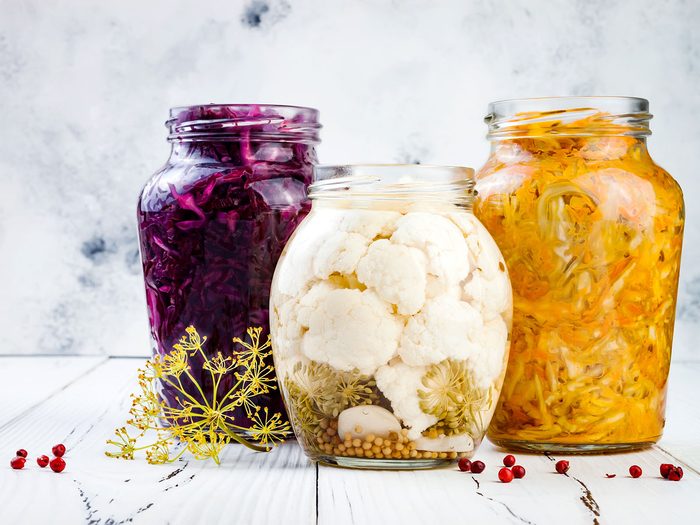
Why probiotic foods?
“Fermented foods, which may contain probiotic bacteria, are an important part of a digestion-friendly, anti-inflammatory eating plan,” says Desiree Nielsen, a registered dietitian and author of Un-Junk Your Diet: How to Shop, Cook, and Eat to Fight Inflammation and Feel Better Forever. The only catch? You can’t just eat probiotic foods occasionally and expect to see results. “You have to eat fermented foods as part of your daily diet in order to support better health,” says Nielsen.
Probiotics can help treat health conditions ranging from eczema and IBS, to high cholesterol and Crohn’s disease. There’s even research to show they could help improve mental health.
Read on to find out which probiotic foods and drinks naturally contain these disease-fighting, beneficial bacteria.
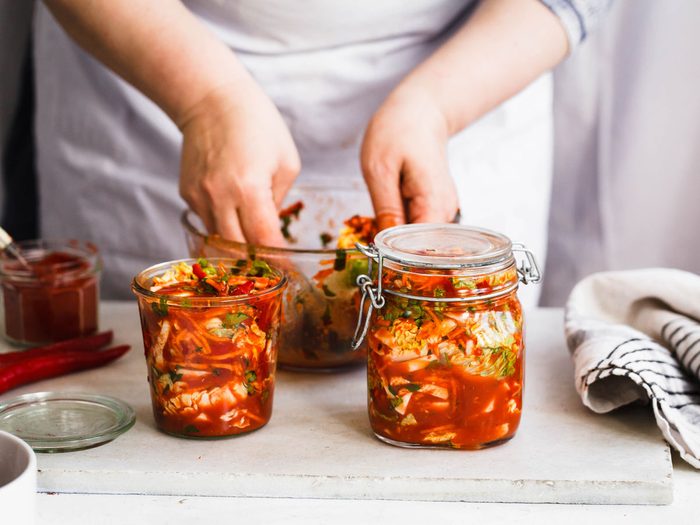
Kimchi
A staple in Korea (and the spiciest fermented food on our list) kimchi is a veggie dish (usually made with cabbage) that has a host of other benefits besides being a probiotic food. “Kimchi has been shown to help lower blood pressure and improve blood glucose and cholesterol levels,” says Nielsen.
One study found that kimchi helps protect against cancer, obesity, and constipation while lowering cholesterol, boosting brain and immune function, and even providing some anti-aging benefits. So important, especially considering these 11 diseases start with your gut bacteria.
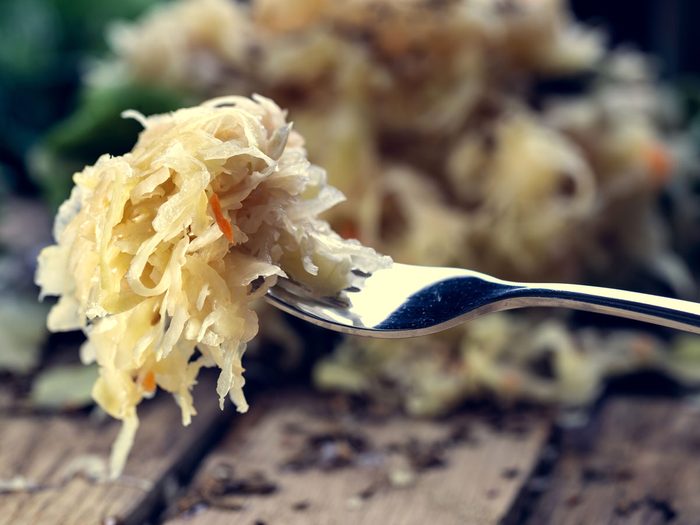
Sauerkraut
Sauerkraut is kimchi’s German cousin, a lacto-fermented brine filled with cabbage, carrots, and spices—not to mention plenty of healthy bacteria for your gut. And not only does it have similar benefits as other fermented veggies, but a study done by the College of William & Mary found that eating a daily serving of sauerkraut helped significantly reduce social anxiety. The researchers believe it’s because more than 80 percent of the calming hormone serotonin is manufactured in our guts (not our brains!) and the good bacteria boosted serotonin production.
Just make sure you read the labels, warns Nielsen, since sauerkraut you find at the grocery store is probably pickled with vinegar, not fermented. She suggests going in search of the good stuff at a health food store. “Look for the words ‘raw’ and ‘fermented’ on refrigerated sauerkrauts,” she says.
Here’s what happens to your body when you stop eating processed foods.
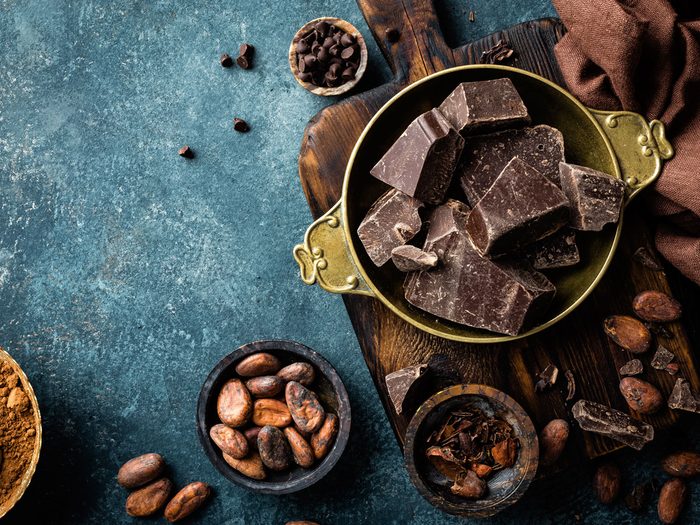
Chocolate
Yes, it’s true! You can add chocolate to your grocery list of probiotic foods, because the sweet treat helps encourage the growth of healthy gut bacteria. A study published in the International Journal of Food Microbiology found that combining chocolate with probiotics magnified the benefits of both. The chocolate protected the bacteria as it passed through the stomach, making sure it was absorbed in the small intestine, while the bacteria helped the body properly digest the chocolate, enabling it to extract all the micronutrients and antioxidants. Talk about a win/win! (Psst: Successful keto dieters never eat these foods – even though they’re keto approved.)
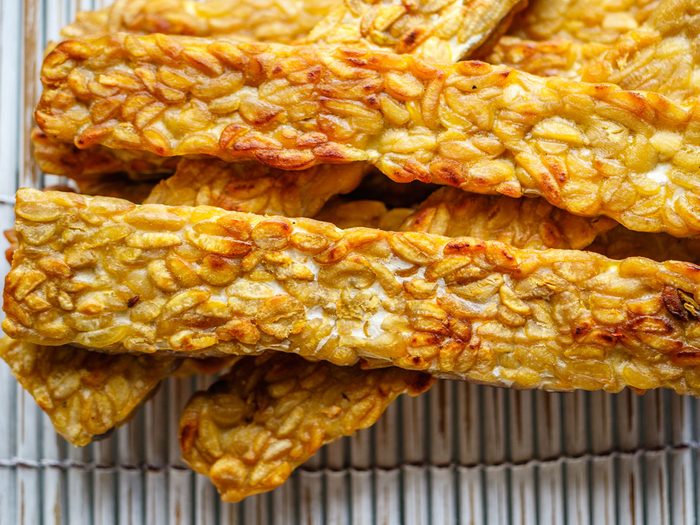
Tempeh
Rich and nutty, this vegetarian-friendly soybean cake is not only a delicious addition to your diet; it also boasts the benefits of fermentation.
If you’re looking to add an extra serving of protein to your diet, tempeh is a good place to start. “It is a wonderful protein source for those on plant-based diets,” says Nielsen.
One cup of tempeh has about 31 grams of protein, which means it’s even more protein-rich than tofu.
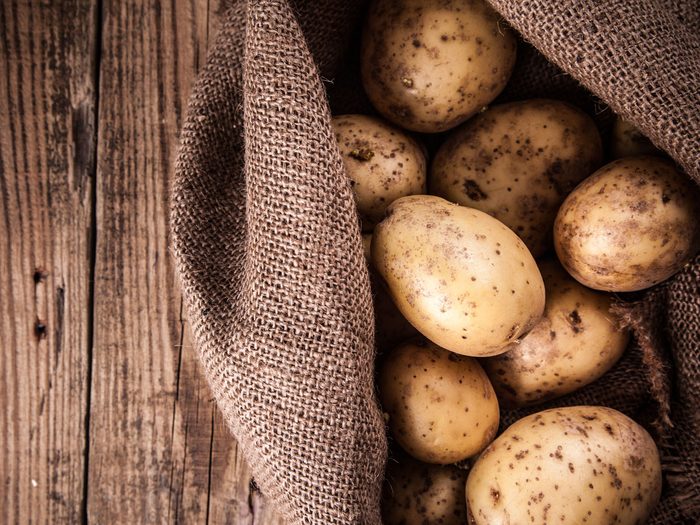
Cold potatoes
Cold potatoes—that is, taters that have been washed, cooked, and cooled—are one of the best sources of resistant starch. Resistant starch is a prebiotic, a type of indigestible carbohydrate that acts like food for gut bacteria, encouraging the good bugs to grow and flourish. While resistant starch has many health benefits, one of its most promising aspects is its ability to increase insulin sensitivity, helping people reduce diabetes risk and even lose weight. Here’s more on the differences between probiotics and prebiotics (both of which are important!).
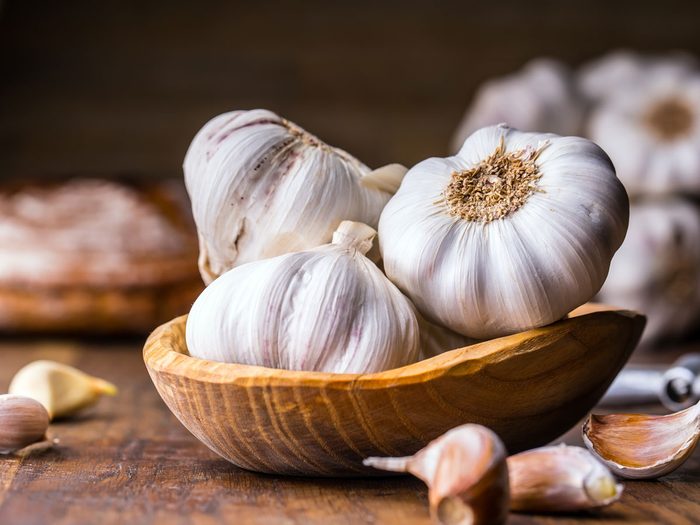
Garlic
Everyone’s favourite way to get bad breath also has powerful gut bacteria-boosting properties. Garlic is not only a favourite spice (after salt) but is also beloved by bacteria thanks to its rich supply of prebiotics, their preferred food. Raw garlic is the best source, but for those who don’t like the burn (or who feel like kissing someone later), cooked garlic also works well—so well in fact that a study published in Food Science and Human Wellness found that eating it is an effective way to prevent many gastrointestinal illnesses.
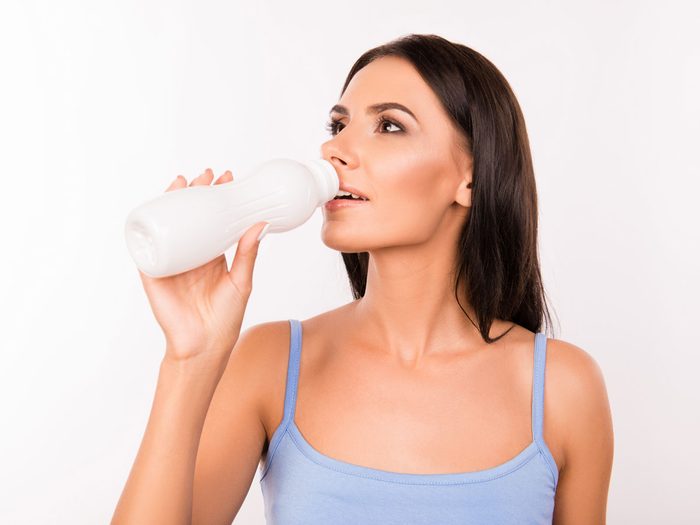
Fermented milk
If you already include milk in your daily diet, try a fermented variety next time to get a dose of probiotics.
“When fermented with a high count of human strain bacteria, like Bio-K+ is, a fermented milk can be a high potency probiotic option that combines the best of both worlds: a fermented food that is also a clinical strength probiotic supplement,” says Nielsen.
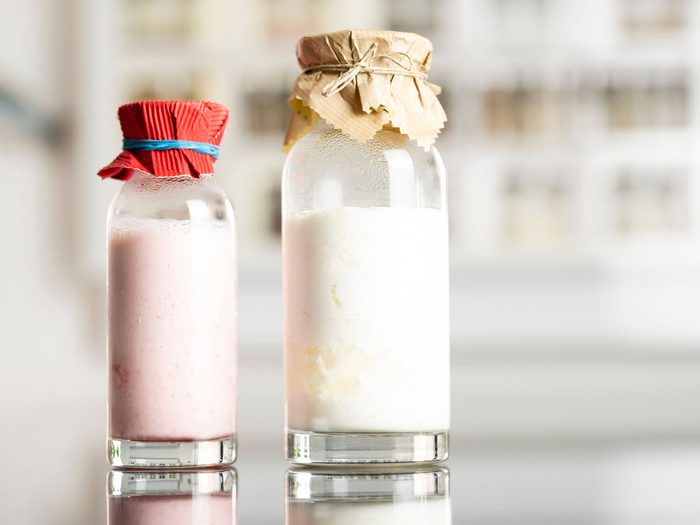
Kefir
This tangy, creamy drink might look (and taste) like a hybrid of yogurt and milk, but the fermentation process is different. The drink is made by seeding milk with kefir “grains,” which are tiny bundles of yeast and bacteria, and letting it sit. Over time the grains ferment the milk, producing a tart drink full of healthy bacteria for your gut, which makes it one of the best probiotic foods you can eat!
“Kefir fermentation includes bacteria and yeasts,” says Nielsen. If you want a big dose of probiotics with your dairy, you’ll be happy to know that the live bacteria count on kefir is usually higher than yogurt.
A 2013 study found that kefir can help relieve gastrointestinal problems and allergies and may even have a positive effect on heart health. One caveat, however: Many commercial kefir drinks contain very high amounts of added sugar, which feeds bad bacteria in your gut, so make sure you read the label and ingredient list.
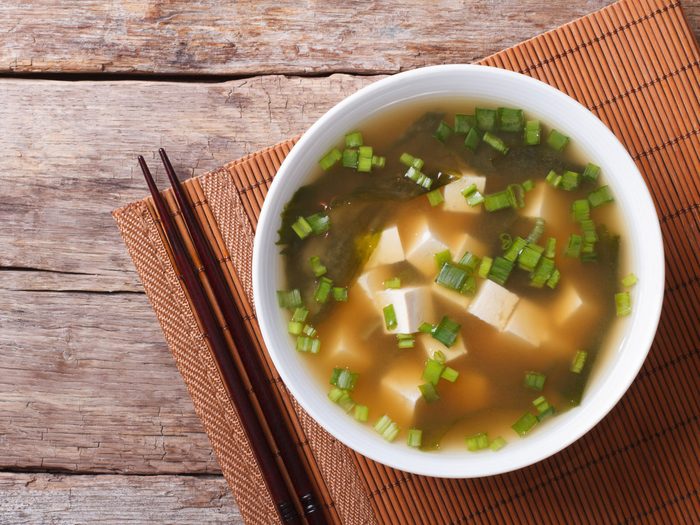
Miso
You might load up on this salty, savoury soup at your favourite Japanese restaurant, but did you know the miso it contains is a healthy addition to your diet?
Grab a container of this fermented soy paste in the health food, or international section of your grocery store. Not only is it a gut-friendly food, it’s also rich in antioxidant phytochemicals, says Nielsen. Just watch out for the high sodium content. Here’s how to master making miso soup at home.
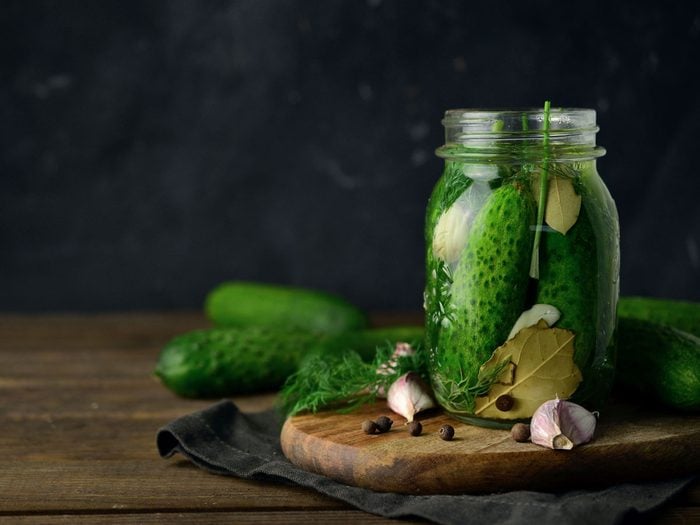
Pickles
Salty and briny, pickles are a go-to sandwich topper — and they’re also a probiotic food.
While you might be tempted to run to the grocery store and grab a jar, Nielsen recommends making your own. “When you ferment at home, you have more chance of preserving the live bacteria count within the food.”
Steer clear of these leftover foods – they’re likely to make you sick.
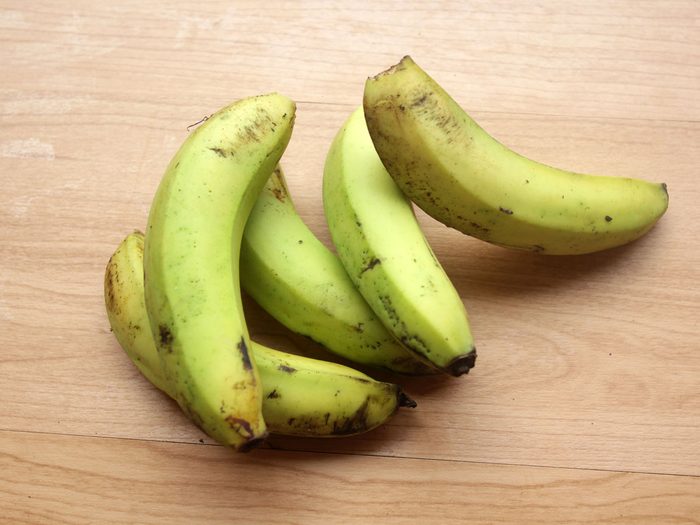
Green bananas
Most people go out of their way to avoid green bananas, but there’s good news for people who just can’t wait until they’re fully ripe. Green bananas are a rich source of prebiotics, particularly resistant starch. They also have a healthy dose of both soluble and insoluble fiber, vitamins, and minerals. The combo provides a feast for good gut bacteria and helps protect your heart and bones. Can’t get past the taste? Try them boiled or fried or sub some green banana flour in place of regular flour.
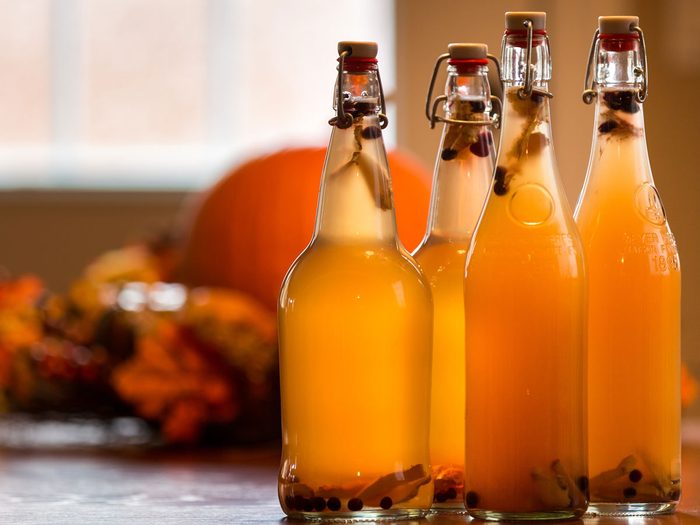
Kombucha
If you’d rather drink your daily dose of probiotics, you might like this fizzy fermented tea that has recently grown in popularity. You can find it in health foods stores or even make your own kombucha at home.
It might be as bubbly and satisfying as soda, but kombucha is loaded with antioxidants and doesn’t have the same hefty dose of sugar. Nielson often recommends it as a healthy swap for people who want to cut sugary beverages from their diets. And, there’s one more thing you should keep in mind when drinking kombucha…

Yogurt
You probably already load up your grocery cart with this breakfast favourite, but its benefits go beyond calcium.
“Yogurt is probably our most famous probiotic food,” says Nielsen. But watch out for artificial ingredients and sugar.
If you want to maximize the health and probiotic benefits of this dietary staple, Nielsen recommends choosing a plain, organic yogurt.
Next, don’t miss these 35 health secrets your body is trying to tell you.
